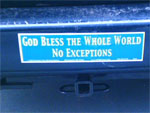The root issues...

I have been taking a bit of a break from blogging. Sensed a need for some space. Pruning away the urge to create something people will find interesting. Trying to write from a place of authenticity--true self. I sense that I need to do this regularly...take a break from the blog...fasting.
I recently read an article by Dennis Martin (now a Roman Catholic) published in the April 2003 Mennonite Quarterly Review. He was co-editor with C. J. Dyck of Mennonite Encyclopedia, Volume V, published I believe in 1990.
This article addresses the questions that have emerged out of my own journey. I attempted to write a paper this spring that worked with these questions and themes.
In my estimation, this article offers an honest engagement with these questions and issues by a worthy intellectual who has not limited where the answers could take him.
I will paste in three separate excerpts from this long article that particularly jumped out at me. The first excert deals with the issue of what guides our worship planning. The second addresses our polity and how we make decisions (i.e. Ordination of Women). The third excerpt addresses how those within the Anabaptist stream read history. I offer no commentary at this point.
I. When I offered this (liturgy) for use at our congregation (Belmont Mennonite in Elkhart), the committee planning worship for a given month or season made use of it or parts of it, but the next month's or season's committee did not. I realized that we would never find out whether it was good, because a liturgy needs to be used consecutively for at least six months until the newness fades completely and people experience it intuitively, at a deeper level of consciousness. Yet I suddenly also realized that it could never be employed that way because if anyone, whether the pastor or a worship committee, proposed its use for such an extended period, to the exclusion of other forms of worship, at least some members of the congregation would be disappointed, if not disaffected. At that point, the pastor (or committee, ultimately, with the pastor's backing) would have had to offend at least some of the congregation and force the liturgy's use. But the pastor (or committee) had no authority to do any such thing because the pastor (or committee) served at the pleasure of the congregation, the congregation no longer had any agreed-upon ways of worshiping, and thus achieving consensus on a single pattern was next to impossible. Once one destroys authoritative patterns that have developed slowly over time, one simply cannot put any single pattern that enjoys authority and wide acceptance in their place without driving away those who disapprove. In such circumstances, variety (chaos, divisiveness) in worship is crucial to avoid lasting division, and necessary to keep everyone at least partly satisfied. The pastor's role becomes that of salesman: he constantly has to convince his congregation that he has earned the right to lead them, and to do that he has to avoid offending any sizable portion of the membership. A "little of this and a little of that" becomes the only real solution. The pastor cannot lead on the basis of his authority but, rather, has to persuade dissenters to go along with the vague consensus and thereby keep the various tastes and conceptions of different portions of the congregation from leading to serious and lasting divisions.
II. And around none of this could a real hammer-and-tongs debate unfold. Observing how the decision to begin ordaining women took place among Mennonites in the 1970s and early 1980s, and watching discussions of women?s roles at the Associated Mennonite Biblical Seminaries during the 1980s, I realized that the vaunted "consensus" model advocated by the Young Turks of the Concern movement, according to which Mennonites surpassed Evangelicals and others who operated by oppressive hierarchy or crass majority vote, actually precluded debate. If decisions were made by consensus, then those who held a former majority position that was shifting by consensus into a minority position had two choices: they could, in persistent debate insist on their position and risk lasting schism, or they could fold their cards and submit to the emerging new consensus. The harder one debated an issue, the more one risked permanent schism. For the sake of unity, wise leaders and members who saw the consensus shifting against themselves censored themselves, and the debate suffocated in the middle of its own birth.
III. All this time I was teaching church history as well as helping to edit the Mennonite Encyclopedia, vol. 5. As I probed more deeply into the patristic period I was teaching, I realized that the Mennonite tradition rested on some fundamental misreadings of history and theology. Here is where my incomplete Mennonite socialization surfaced: had I been a dyed-in-the-wool, fully assimilated Mennonite, I might have been able to read the patristic and medieval evidence through Mennonite-focused binoculars, as other Mennonite historians did. But I was not equipped for doing so. I simply could not see my way clear to massage the patristic and medieval evidence into a Free Church model.










